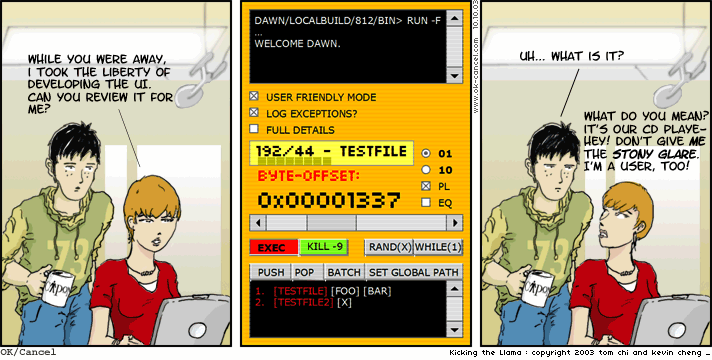Apple’s iPhone only supports third-party applications that have been created with Apple’s software development kit, and then reviewed, approved, and placed in the iTunes App Store by Apple’s own employees. I’ve long thought that this restrictive practice was counter-productive, chiefly because it serves to severely limit the number and breadth of developers who can contribute great software creations.
But I realized this evening that, by pursuing its strategy of fiercely controlling access to its App Store, Apple in some ways gets the best of both worlds. Inside the App Store, only vetted, well-fundedtested, certified programs can be downloaded (usually for a small fee). Outside the App Store – in the land of the “cracked” and the “jailbroken” – novel applications, developed by pirates, provide in-demand features and must-have functionality.
Inside the App Store, applications are bound to conform to Apple’s enforced limitations on hardware and software in the iPhone. For reasons both financial and technical, applications can’t access system settings that pertain to core Phone or iPod functions. This stifles innovation, because Apple’s own employees may not get around to implementing these features, especially if they bump up against the concerns from Marketing, Legal, and Major Accounts. For reasons that are purely financial, Apple requires U.S.-based iPhones to work exclusively with AT&T. This limits adoption of the device, as many potential users prefer (or need) to use a different service provider.
But, developers outside the App store are a different story. Anyone with the skill, interest, and time can create applications for the iPhone, and distribute them. Of course, only users who have deliberately and systematically altered their iPhones’ software can use these “rogue” programs.
While Apple argues in court that these users are breaking the law when they “jailbreak” their iPhones, their App Store managers are keeping a keen eye on the gray market of unauthorized iPhone applications.
Applications like TouchTerm (sssh) have already migrated from the “jailbroken” hacks to Official Applications, in a way that can offer significant financial rewards to the developers (and to Apple). They create functionality that’s desired by a number of users, and it doesn’t infringe on anyone’s “digital rights.” Other apps, like iPhone Video Recorder, are still renegade, but probably won’t be for long. Finally, the process of “unlocking” a “jailbroken” iPhone will probably never reach the App Store, because it threatens Apple’s and AT&T’s precious recurring revenue streams.
By keeping tight control over the Applications that appear in the App Store, Apple2 is able to enforce standards for reliability and compliance – and they can also cover their asses, legally speaking. Meanwhile, unpaid and unrelated (even unlawful) developers are busy creating and testing brand-new applications which, if they work, end up in the App Store. Apple gets a lot of upside from this, with little apparent risk.
Of course, if enough users jailbreak and then unlock their iPhones, Apple and AT&T lose revenue, limiting Apple’s further hardware and software development of the platform. But most user’s don’t bother, because the App Store’s selections are good enough. And those who do – the self-described bleeding edge – make great beta testers.
Notes:
1. By the distributive property, the phrase
Apple's App Store Approach
can also be written
(App) * (le's + " Store" + roach)
2. Similarly,
(App) * ("lications that" + "ear in the" + " Store," + le)



 “Since the beginning of time man has yearned to destroy the sun. I will do the next best thing…block it out!”
“Since the beginning of time man has yearned to destroy the sun. I will do the next best thing…block it out!”
